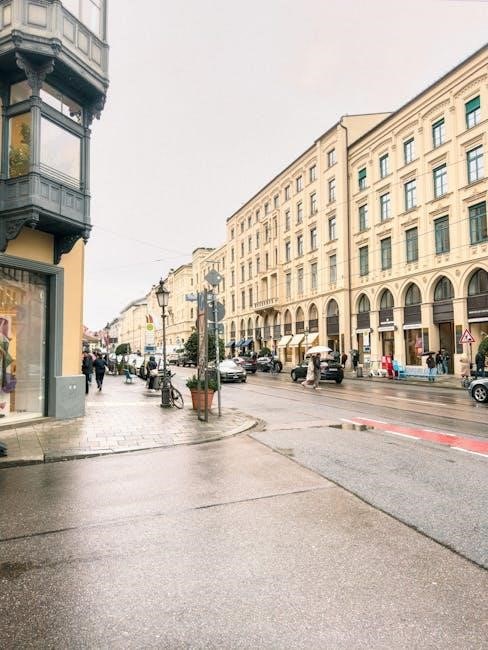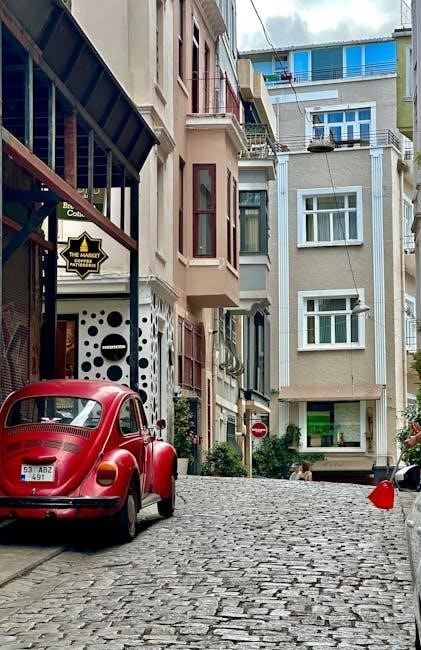Cormac McCarthy’s The Road is a haunting post-apocalyptic novel exploring survival, humanity, and hope. Its minimalist prose and profound themes resonate deeply, making it a vital read.
Overview of the Novel
The Road by Cormac McCarthy is a haunting post-apocalyptic novel that follows a father and son as they navigate a barren, devastated world. The story unfolds without specific details about the cataclysmic event that caused the destruction, focusing instead on the duo’s struggle for survival. Their journey is marked by scarcity, danger, and moral dilemmas, as they confront the remnants of humanity. McCarthy’s sparse, minimalist prose intensifies the bleakness of their existence, while the bond between the father and son serves as a beacon of hope. The novel explores themes of survival, humanity, and the enduring power of love amidst unimaginable despair, leaving readers with a profound and lingering impression of a world on the brink of extinction.
Dedication to John Francis McCarthy

Cormac McCarthy dedicated The Road to his son, John Francis McCarthy, reflecting the novel’s central theme of the father-son relationship. This personal touch underscores the emotional depth of the story, as the bond between the protagonists mirrors the author’s own connection with his child. The dedication adds a layer of authenticity, highlighting the universality of paternal love and protection. McCarthy’s choice to honor his son emphasizes the novel’s exploration of hope, survival, and the enduring human spirit. This dedication serves as a poignant reminder of the personal inspirations behind the narrative, grounding the post-apocalyptic tale in a deeply personal and relatable context.
Setting and Worldbuilding
The Road unfolds in a desolate, post-apocalyptic world, where the landscape is consumed by ash and grayness. The road serves as a central, unifying element, symbolizing survival and journey.

The Post-Apocalyptic Landscape
The world in The Road is a barren, ashen wasteland, devoid of life and color. The once vibrant Earth is now a gray, lifeless expanse, where the sky is perpetually shrouded in a dim haze. The landscape is littered with remnants of civilization—dead trees, abandoned buildings, and the occasional skeletal remains of animals. McCarthy’s vivid imagery paints a chilling picture of environmental collapse, where nature itself seems to have been extinguished. The absence of flora and fauna underscores the severity of the apocalypse, leaving only dust, ash, and the eerie silence of a world without life. This desolate backdrop serves as both a literal and metaphorical setting for the characters’ struggle to survive and retain their humanity.
The Significance of the Road as a Central Plot Device

The road in Cormac McCarthy’s The Road serves as both a literal and symbolic journey for the father and son. It represents their relentless pursuit of survival, hope, and meaning in a devastated world. The road is a constant presence, guiding their path and defining their daily struggles. It symbolizes the unknown, with each step forward holding the promise of salvation or peril. McCarthy uses the road to explore themes of perseverance, morality, and the human condition. The road becomes a metaphor for life itself—a journey fraught with challenges, where every decision impacts their survival. Through this central plot device, McCarthy underscores the enduring strength of the human spirit in the face of unimaginable adversity.

Major Themes in “The Road”
The novel explores survival, humanity, and hope in a broken world. It delves into moral decay, the father-son bond, and the enduring human spirit amidst catastrophe.
Survival and Humanity in a Broken World
In The Road, Cormac McCarthy explores the raw struggle for survival in a post-apocalyptic world, where humanity teeters on the brink of extinction. The father and son’s journey through a barren, ashen landscape underscores the fragility of life and the moral choices that define human decency. Amidst the relentless pursuit of food, shelter, and safety, their bond becomes a beacon of hope. The novel questions what it means to retain humanity in the face of unimaginable despair, as the characters confront cannibalism, violence, and the erosion of societal norms. McCarthy’s prose strips away ornamentation, mirroring the starkness of their world, yet illuminates the enduring power of love and the human spirit. The recurring motif of “carrying the fire” symbolizes their commitment to goodness, even as the world around them crumbles.
The Father-Son Relationship
The father-son dynamic in The Road is the emotional core of the novel, set against a desolate backdrop. Their relationship is marked by a deep bond forged through shared hardship. The father’s primary motivation is to protect his son, teaching him moral values in a world devoid of structure. McCarthy portrays the father’s struggle to balance survival instincts with fostering the boy’s innocence and humanity. The son, in turn, often serves as the father’s moral compass, reminding him of the importance of compassion. Their interactions are sparse yet poignant, highlighting their reliance on each other for emotional and physical survival. This relationship underscores the enduring strength of familial love in the face of unimaginable adversity.
Morality and the Concept of “Carrying the Fire”
In The Road, morality is a fragile yet enduring force in a world stripped of civilization. The concept of “carrying the fire” emerges as a metaphor for preserving humanity, compassion, and goodness. The father repeatedly tells the son that they are “carrying the fire,” distinguishing them from the morally bankrupt survivors who have abandoned ethics. This idea becomes a moral anchor, guiding their decisions and providing hope in a bleak existence. The son, with his innate kindness, embodies this concept most profoundly, challenging the father to uphold their humanity even when survival seems impossible. McCarthy uses this motif to explore the resilience of morality in the face of unimaginable despair, emphasizing its importance as a beacon of light in a dying world.

Symbolism in the Novel
The Road is rich in symbolism, with fire representing hope and morality, while the desolate landscape mirrors humanity’s spiritual decay. The journey itself symbolizes resilience and existential struggle.

The Symbolism of Fire
In The Road, fire symbolizes hope, morality, and humanity’s enduring spirit. The father repeatedly reminds the son that they are “carrying the fire,” signifying their commitment to goodness in a world devoid of light. Fire represents life, warmth, and the preservation of humanity amidst overwhelming despair. It contrasts sharply with the novel’s bleak, ashen landscape, serving as a beacon of resilience. The father’s determination to protect the fire, both literally and metaphorically, underscores the importance of maintaining hope and ethical values in the face of catastrophic destruction. This symbolism reinforces the novel’s central themes of survival, morality, and the enduring human spirit. Fire, thus, becomes a powerful metaphor for the light that guides humanity through its darkest hours.

The Gray and Ashen World as a Metaphor
The gray and ashen world in The Road serves as a poignant metaphor for the moral and environmental decay of humanity. The absence of color and life creates a desolate, oppressive atmosphere, reflecting the characters’ internal struggles and the loss of hope. McCarthy’s vivid descriptions of the barren landscape mirror the breakdown of society and the erosion of moral frameworks. The relentless grayness underscores the characters’ isolation and the futility of their existence in a world devoid of beauty or vitality. This bleak imagery reinforces the novel’s themes of survival, despair, and the fragility of human civilization, leaving readers with a haunting reminder of what could be lost.

Character Analysis
The father and son in The Road are central figures, with the father driven by survival instincts and the son embodying innocence and hope in a harsh world. Their relationship highlights resilience and humanity amidst devastation, while their unnamed status emphasizes their universal roles in the story.
The Father: His Role and Motivations
The father in The Road is the protagonist, driven by a primal urge to protect his son in a devastated world. His motivations stem from love, survival, and the need to preserve humanity. He embodies resilience, navigating a harsh environment with minimal resources. His actions are dictated by a fierce determination to ensure his son’s safety, even as he grapples with moral dilemmas. The father’s role is both practical and symbolic, as he strives to teach the boy the importance of “carrying the fire,” a metaphor for hope and goodness. His sacrifices and unwavering commitment highlight the depth of paternal love in the face of unimaginable adversity.
The Son: Innocence and Hope in a Harsh World
The son in The Road represents innocence and hope amidst a desolate landscape. His naivety contrasts sharply with the world’s brutality, offering a fragile optimism. Despite the horrors around him, he retains a sense of morality, questioning the father’s harsh decisions. His character symbolizes the possibility of redemption and the preservation of humanity. The son’s curiosity and empathy serve as a counterbalance to the father’s pragmatism, highlighting the importance of maintaining compassion in a broken world. Through his journey, McCarthy underscores the resilience of innocence and the enduring power of hope, even in the face of overwhelming despair.
Writing Style and Structure
McCarthy’s minimalist prose in The Road features sparse, direct language, reflecting the harsh simplicity of the post-apocalyptic world. His writing emphasizes clarity and emotional depth, avoiding unnecessary embellishments to focus on the core themes of survival and existence.
McCarthy’s Minimalist Prose
Cormac McCarthy’s writing in The Road is characterized by a sparse, minimalist style that mirrors the bleakness of the post-apocalyptic world. His prose is stripped of embellishments, focusing on essential details and direct dialogue. This simplicity intensifies the emotional weight of the narrative, drawing readers into the harsh reality faced by the father and son. McCarthy’s avoidance of flowery language underscores the desperation and urgency of their journey. The minimalist approach also heightens the universality of the story, allowing readers to connect deeply with the characters’ raw emotions and struggles. This style not only reflects the physical barrenness of the world but also the emotional and moral stripped-down state of its inhabitants.

The Use of Vague Imagery and Sparse Details
Cormac McCarthy employs vague imagery and sparse details in The Road to create a hauntingly ambiguous atmosphere. The novel’s descriptions of the post-apocalyptic world are often fragmented and devoid of specific details, leaving much to the reader’s imagination. This technique emphasizes the desolation and uncertainty of the environment, mirroring the characters’ own lack of knowledge. The absence of vivid descriptions allows the focus to remain on the emotional and moral struggles of the father and son. McCarthy’s sparse details also underscore the themes of decay and the erasure of civilization, leaving the reader with a sense of emptiness and existential dread. This narrative choice heightens the novel’s universal and timeless appeal.
Reception and Reviews
The Road received widespread critical acclaim, winning numerous awards and being hailed as a masterpiece. Critics praised its gripping narrative and profound exploration of human resilience and morality.
Critical Acclaim and Awards
The Road earned widespread critical acclaim and numerous prestigious awards, including the Pulitzer Prize for Fiction in 2007. Critics praised its haunting prose, emotional depth, and unflinching portrayal of survival. The novel was hailed as a masterpiece, with many considering it McCarthy’s magnum opus. Its exploration of humanity, hope, and morality resonated deeply with readers and scholars alike. The book became a national bestseller and received rave reviews from major publications, such as the San Francisco Chronicle, which called it “gripping, frightening, and ultimately beautiful.” McCarthy’s minimalist style and the novel’s universal themes solidified its place in contemporary literature, cementing its legacy as a defining work of the 21st century.
Reader Responses and Interpretations
Readers of The Road have been deeply moved by its emotional intensity and haunting imagery. Many interpret the novel as a powerful exploration of love, survival, and the human spirit. The father-son relationship is seen as a symbol of hope and resilience in a devastated world. Some readers have noted the minimalist prose adds to the novel’s stark, apocalyptic atmosphere. Others have praised the moral questions it raises, particularly the concept of “carrying the fire,” which has sparked debates about humanity’s enduring goodness. The novel’s ambiguity has led to diverse interpretations, making it a subject of both personal reflection and academic analysis. Its ability to evoke strong emotions and challenge readers’ perspectives has left a lasting impact on audiences worldwide.
The Road leaves readers with a profound reflection on humanity’s resilience and the enduring power of love in the bleakest conditions, solidifying McCarthy’s legacy as a literary giant.
The Lasting Impact of “The Road”
Cormac McCarthy’s The Road has left an indelible mark on modern literature, captivating readers with its raw portrayal of survival and hope. Its exploration of human resilience in a shattered world resonates deeply, making it a defining work of the 21st century. The novel’s sparse, haunting prose underscores the fragility of life and the enduring power of love. Dedicated to McCarthy’s son, John Francis, the story symbolizes the passage of humanity’s torch through generations. The imagery of fire as a symbol of goodness and morality has become iconic, inspiring countless interpretations. The Road continues to be widely studied and admired, cementing McCarthy’s status as a literary master.
McCarthy’s Legacy and the Novel’s Place in Literature
Cormac McCarthy’s The Road solidifies his legacy as a master of contemporary literature. This novel, alongside works like Blood Meridian, showcases his ability to weave haunting narratives that explore the depths of human nature. The Road stands as a testament to McCarthy’s minimalist prose and his unique ability to evoke profound emotions through sparse, evocative language. The novel’s exploration of survival, morality, and hope in a post-apocalyptic world has earned it critical acclaim and a dedicated readership. It is frequently regarded as one of the defining books of the 21st century, ensuring McCarthy’s place among the greatest literary voices of our time.

Be First to Comment